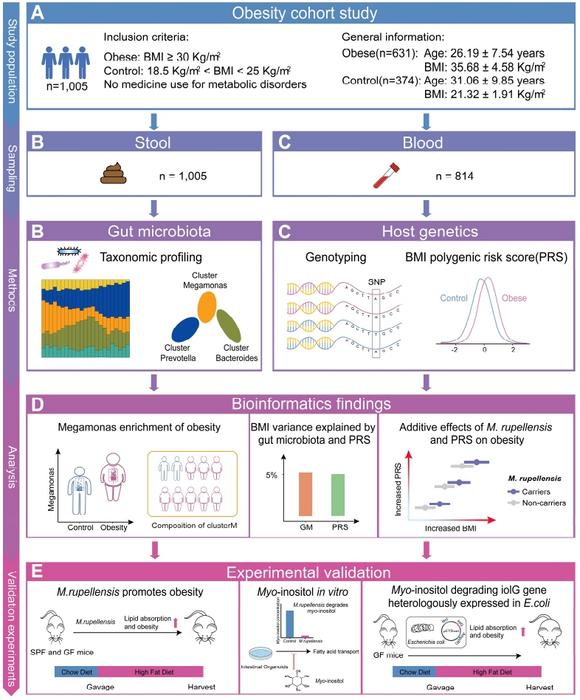A recent study published in Cell Host & Microbe identifies a potential obesity-linked bacterium, Megamonas, from a large-scale cohort of obese individuals in China. This research suggests potential strategies for future obesity management by illustrating how the bacterium degrades intestinal myo-inositol, enhances lipid absorption, and contributes to obesity.

Credit: BGI Genomics
A recent study published in Cell Host & Microbe identifies a potential obesity-linked bacterium, Megamonas, from a large-scale cohort of obese individuals in China. This research suggests potential strategies for future obesity management by illustrating how the bacterium degrades intestinal myo-inositol, enhances lipid absorption, and contributes to obesity.
The study is jointly conducted by Ruijin Hospital affiliated with Shanghai Jiao Tong University School of Medicine, BGI Research, and BGI Genomics Institute of Intelligent Medical Research (IIMR).
“Through a large-scale study of intestinal metagenome and host genome in obese Chinese, this research reveals a strong link between gut Megamonas and obesity,” said Dr. Yang Fangming, co-first author from BGI Genomics. Dr. Yang adds, “The research uncovers the mechanism by which Megamonas induces obesity, providing a new target bacterium for the diagnosis and treatment of obesity.”
The researchers performed metagenomic sequencing on fecal samples from 1,005 individuals, including 631 obese individuals and 374 normal-weight individuals, and conducted whole-genome sequencing (WGS) on 814 of these participants. They reveal a strong link between Megamonas and obesity—the combination of Megamonas and host genetic risk factors significantly increased the likelihood of obesity.
In the analysis, comprising both obese and normal-weight participants, metagenomic sequencing showed a notable increase in Megamonas in the intestines of obese individuals. All of the samples were further categorized into three enterotypes based on core genera: Bacteroides, Prevotella, and Megamonas. Individuals with the Megamonas-dominated enterotype had higher BMI and a greater incidence of obesity.
WGS was performed on 814 individuals to explore the influence of Megamonas across various genetic obesity risk backgrounds. The researchers discovered that gut microbial imbalance has a more significant impact on obesity in individuals with low genetic risk. They concluded that Megamonas has an additive effect with host genetics on obesity.
The findings were further supported by animal studies. Megamonas rupellensis significantly increased weight and fat accumulation in mice on a high-fat diet. The bacterium degrades myo-inositol, a compound that effectively inhibits fatty acid transport. Its degradation enhances intestinal fat absorption, leading to obesity.
About Whole Genome Sequencing (WGS)
BGI Genomics’ whole genome sequencing (WGS) service detects the complete genome sequence at one time and provides a high-resolution, base-by-base view of the genome. This enables researchers to see both large and small variants and identify potential causative variants for further follow-on gene expression or regulation mechanism studies.
About BGI Genomics
BGI Genomics, headquartered in Shenzhen, China, is the world’s leading integrated solutions provider of precision medicine. Its services cover more than 100 countries and regions, involving more than 2,300 medical institutions and 10,000 employees worldwide. In July 2017, as a subsidiary of BGI Group, BGI Genomics (300676.SZ) officially began trading on the Shenzhen Stock Exchange.
Journal
Cell Host & Microbe
DOI
10.1016/j.chom.2024.06.012
Article Title
Obesity-enriched gut microbe degrades myo-inositol and promotes lipid absorption
Article Publication Date
11-Jul-2024




